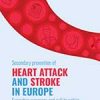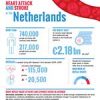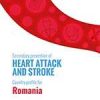What we’ve achieved
As part of a multi-year project investigating secondary prevention of heart attack and stroke, HPP developed one of the most comprehensive policy analyses yet undertaken of this issue in Europe – a consensus report based on interviews and consultation with more than 30 experts as well as an analysis of European data and research. The project focused on 11 countries: Austria, Belgium, France, Germany, Greece, Italy, the Netherlands, Poland, Romania, Spain and the UK.
The report explores the evidence around secondary prevention of heart attack and stroke, and highlights gaps in quality care across Europe. It identifies five policy priorities for action, and provides real-world examples of best practice. The executive summary and call to action have also been published in a separate summary document.
This work is intended to provide a powerful, evidence-based narrative for policy and system transformation in secondary prevention of cardiovascular disease, at a time of significant pandemic-related disruptions and growing impetus among advocates for more effective policies to compensate for many years of neglect.
The consensus report was developed alongside national-level reports for each of the 11 countries. These country profiles are accompanied by four-page summaries highlighting the current situation and opportunities for improvement in each country. These documents were developed for use at the national level, and several have been made available in the public domain.




